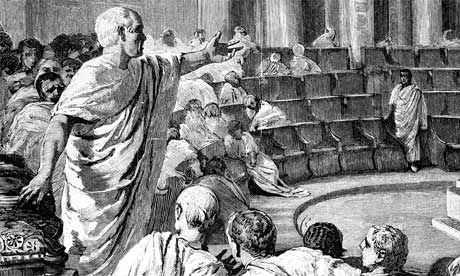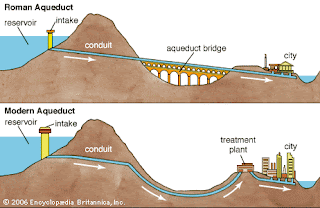Cicero tells the citizens that they have finally thrown Catiline out of the city(vel eiecimus vel emisimus vel ipsum...) and that as Catiline was leaving he was pursued with nice words(verbis prosecuti sumus). Catiline is described by Cicero to be raging with audacity, and breathing crime. Cicero also adds that Catiline was wickedly plotting destruction of his own country and that he was threatening the people and Rome with fire(furentum audacia, scelus anhelantem...vobis atque huic ferro flammaque minitantem...)
Conspirators
Cicero addressed his second oration to the people on November 8th, the day after he orated against Catiline in the senate. This oration was different from the first because Cicero mentioned the 6 classes of conspirators which helped to explain the background of the plot. Another difference was that Cicero's audience in the Senate was generally sympathetic, while when he was speaking before the people most of his audience sided with Catiline.
Cicero begins by pointing out the fact that other people were involved in the conspiracy and he shouldn't be focused on just one enemy. This enemy he has been spending so much time talking about is Catiline, and he also points out that Catiline has confessed to be an enemy. When Cicero says this he means that Catiline confessed to be an enemy because he left the city to join Manlius. It was rumored that Catiline was exiled, however he was just leaving to join his illegal army.(et de eo hoste qui iam fatetur se esse hostem). Cicero also makes sure to say he is not afraid of Catiline because there is a wall between them, which is something that he wanted. This means that since Catiline left, Cicero is protected by Rome's city borders(quod semper volui, murus interest, non timeo).
Next, Cicero asks the people whether or not they said anything about those who deny the truth, who remain in Rome, and who are with them(qui Romae remanent, qui nobiscum sunt, nihil dicimus?). This means that there are conspirators all around but the people aren't taking action or saying anything about it.
Cicero starts to change the subject back to the other conspirators. He said that he decided not to punish the men but to cure them(non tam ulcisci studeo quam sanare sibi ipsos). When Cicero said he wanted to cure the men he meant that he wanted to help them for their own good and for the good of the country. Cicero does have hope that he can help these men, but only if they choose to listen to him(...si iam me audire volent).
Cicero further explains to the citizens what kinds of men have been raised troops(ex quibus generibus hominum istae copiae comparentur). Lastly, he states that if he is able to, he will bring forth the medicine of his plan and speech to cure the other men one by one(deinde singulis medicinam consili atque orationis meae, si quam potero, afferam). Cicero makes himself look good and seem like he's heroic when he says that he wants to cure the other men. It makes it seem like he is the good guy in the scenario.
Background Research
According to Cicero, there are 6 classes of men that belong to Catiline's conspiracy. The 1st class consists of men who are in great debt but also have greater possessions. They appear honorable and are actually rich since they have land, houses, silver, and slaves. However, they don't want to give up these possessions in order to pay off their debt. The 2nd class consists of men who are also in debt, but are also looking to gain political control. The 3rd class is the class that Manlius belongs to however Catiline took his place. The men in this class are from the colonies that Sulla, the Roman political and military leader, created. Since these men are from Sulla's colonies they are arrogant and greedy from their sudden riches. The 4th class consists of men who have been deeply in debt for a long time. They are generally lazy and extravagant which results in their serious debt. The 5th class consists of assassins , murderers and criminals who can't be contained in prison. The 6th and final class is Catiline's class that he chose. They appear with combed sleek hair, either with or without beards, and ankle-length tunics. This class also has gamblers, adulteries who are shameless. Cicero states that if these people remain then there will be more people just like Catiline in the republic.

The Rostra was where orators spoke to the people. Its name comes from the six rostra, or warships rams, that were captured during the victory at Antium in 338 BC. Caesar came up with the orginal plan but Augustus finished it in 42 BC. While talking, the orators would face the north side towards the senate. This platform was used during the republican and imperial periods and the remains can still be seen today.








